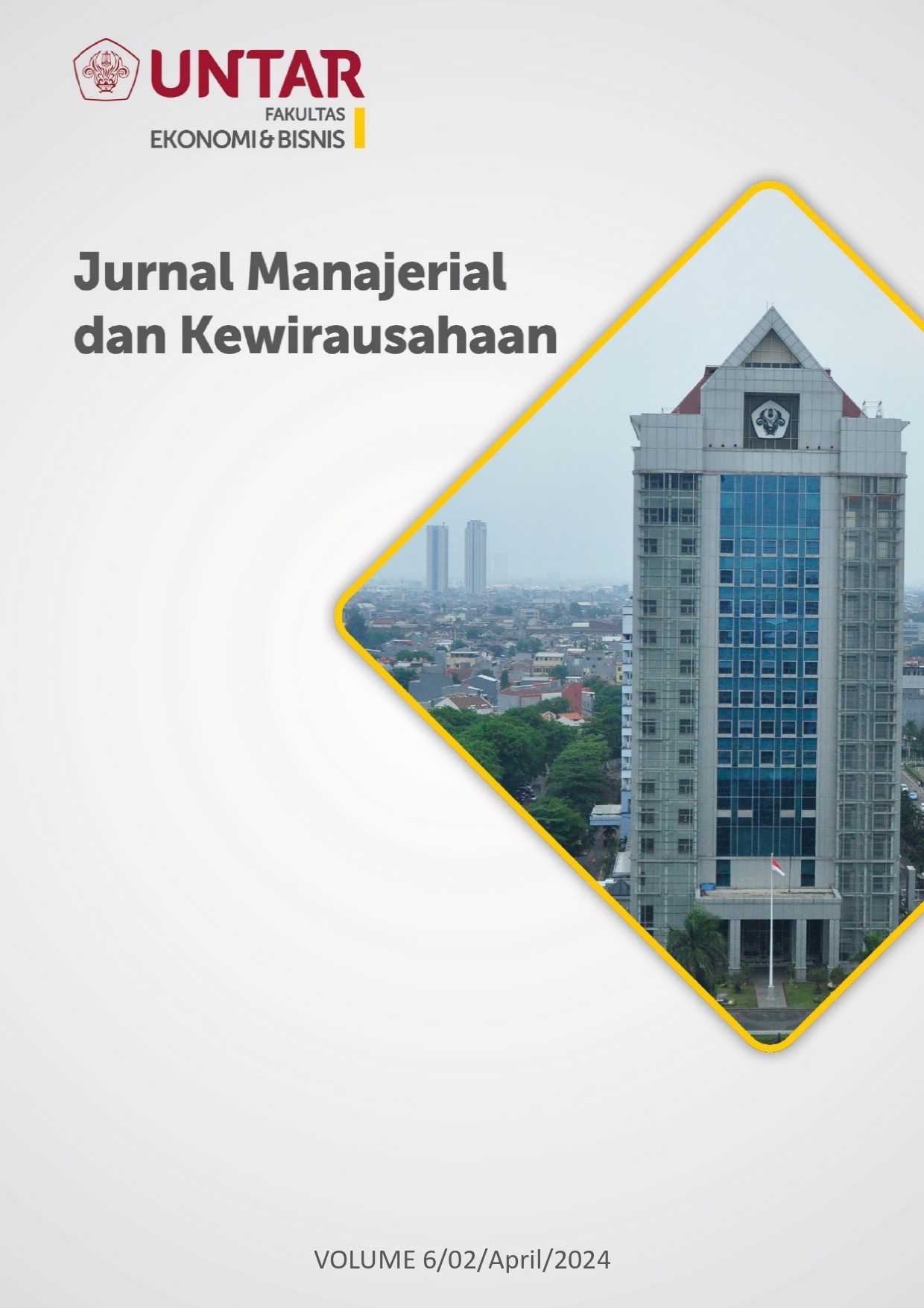Faktor Penentu Kesejahteraan Finansial pada Generasi Muda di Jakarta
Main Article Content
Abstract
The purpose of this study is to determine the influence of financial attitude and locus of control to financial well-being with financial behavior as intervening variable. This study used non probability method with a purposive sampling technique. The sample for this research are young generation aged 11-26 living in West Jakarta. Data was obtained through questionnaires distributed on 187 respondents of generation z that had worked and had income on their own. Data was analyzed with SEM through Smart-PLS 4.0.9.6. software, The research results show that financial attitudes and locus of control have a positive effect on financial behavior and financial well-being. Apart from that, financial behavior can influence financial well-being. However, the study indicated that financial behavior variables do not mediate the relationship between financial attitudes and financial well-being. Likewise, locus of control has no influence on financial well-being if it is mediated by financial behavior.
Article Details
Section

This work is licensed under a Creative Commons Attribution-NonCommercial-ShareAlike 4.0 International License.
This work is licensed under a Jurnal Muara Ilmu Ekonomi dan Bisnis Creative Commons Attribution-ShareAlike 4.0 International License.,/p>
References
Badan Pusat Statistik. (2023). Profil Kemiskinan di Indonesia Maret 2023. https://www.bps.go.id/pressrelease/2023/07/17/2016/profil-kemiskinan-di indonesia-maret-2023.html.
Baptista, S. M. J. & Dewi, A. S. (2021). The Influence of Financial Attitude, Financial Literacy, and Locus of Control on Financial Management Behavior. International Journal of Social Science and Business, 5(1), 93-98. https://doi.org/10.23887/ijssb.v5i1.31407
Databoks. (2022). Kepadatan Penduduk di Provinsi DKI Jakarta menurut Wilayah (Juni 2022). https://databoks.katadata.co.id/datapublish/2022/10/09/jakarta pusat-jadi-wilayah-terpadat-di-ibu-kota-per-juni-2022.
Gutter, M., & Copur, Z. (2011). Financial Behavior and Financial Well-Being of College Students: Evidence from A National Survey. J Fam Econ Iss. 32: 699-714.
Hair, J.F., Risher, J.J., Sarstedt, M., & Ringle, C.M. (2019). When to Use and How to Report The Results of PLS-SEM. European Business Review. 31(1):2-24. https://doi.org/10.1108/EBR-11-2018-0203
Iramani, R., & Lutfi, L. (2021). An Integrated Model of Financial Well-BeingL The Role of Financial Behavior. Accounting. 7:691-700. https://doi.org/10.5267/j.ac.2020.12.007
Kompas. (2021). Pengaruh Karakteristik Geografis Dengan Kehidupan Sosial Budaya. https://www.kompas.com/skola/read/2021/07/22/144226369/pengaruhkarakteristik-geografis-dengan-kehidupan-sosial-budaya?page=all
Lavonda, P., Setyawan, I. R., & Ekadjadja, M. (2021). Determinants of Financial Well-Being among Young Workers in Jakarta during the Covid-19 Pandemic. Jurnal Ekonomi, 26(2), 295-310. http://dx.doi.org/10.24912/je.v26i2.747
Maharani, N. (2023). Menjadi Gen Z Yang Sehat Finansial. https://buletin.nscpolteksby.ac.id/menjadi-gen-z-yang-sehat-finansial/.
Malhotra, N. K. (2020). Marketing research, In The Marketing Book.
Malik, F., & Marwaha, R. (2023). Cognitive Development. National Library of Medicine. https://www.ncbi.nlm.nih.gov/books/NBK537095/.
Merdeka. (2023). Dihuni 11,24 Juta Jiwa Penduduk, Jakarta Jadi Kota Terpadat ke-28 di Dunia. https://www.merdeka.com/jakarta/foto-dihuni1124-juta-jiwa-penduduk-jakarta-jadi-kota-terpadat-ke-28-di-dunia-10108 mvk.html
Pratama, J. & Widoatmodjo, S. (2023). Faktor Determinan pada Financial Well-Being Pekerja Dewasa di Jakarta. Jurnal Manajemen Bisnis dan Kewirausahaan, 7(5), 1022-1034. https://doi.org/10.24912/jmbk.v7i5.26503
Purnomo, S. D., & Istiqomah. (2019). Economic Growth and Poverty: The Mediating Effect of Employment. Journal of Economics and Policy. 12(1):238-252.
Rai, K., Dua, S. & Yadav, M. (2019). Association of financial attitude, financial behavior and financial knowledge towards financial literacy: a structural equation modeling approach. FIIB Business Review, 8(1), 51-60. https://doi.org/10.1177/2319714519826651
She, L., Rasiah., Turner, J. J., Guptan, V., & Nia, H. S. (2021). Psychological Beliefs and Financial Well-Being Amon Working Adults: The Mediating Role of Financial Behaviour. International Journal of Social Economics. 49(2), 190-209. https://doi.org/10.1108/IJSE-07-2021-0389.
Shih, H. M., Chen, B. H., Chen, M. H., Wang, C. H., & Wang, L. F. (2022). A Study of The Financial Behavior Based on the Theory of Planned Behavior. International Journal of Marketing Studies. 14(2):1-12. https://doi.org/10.5539/ijms.v14n2p1
Soepding, B.A., Munene, J.C., & Abaho, E. (2021). Sustaining Retirees’ Financial Well-Being: The Nigerian Experience. International Journal of Ethics and Systems. 37(2):318-340. https://doi.org/10.1108/IJOES-07-2020-0118
Strömbäck, C., Lind, T., Skagerlund, K., Västfjäll, D., & Tinghög, G. (2017). Does Self-Control Predict Financial Behavior and Financial Well-Being. Journal of Behavioral and Experimental Finance. 14:30-38. http://dx.doi.org/10.1016/j.jbef.2017.04.002
The Conversation. (2023). Masyarakat Indonesia Masih Rentan Jatuh Miskin, Apa Penyebabnya? https://theconversation.com/masyarakat-indonesia-masih-rentan-jatuh-miskin-apa-penyebabnya-198679.
Ullah, S., & Yusehng, K. (2020). Financial Socialization, Childhood Experiences and Financial Well-Being: The Mediating Role of Locus of Control. Front Psychology. 11:2162. https://doi.org/10.3389/fpsyg.2020.02162
Vikmawati, A. (2019). Analisis Faktor-Faktor yang Mempengaruhi Keputusan Penggunaan E-Money dengan Minat Menggunakan E-Money sebagai Variabel Intervening. Skripsi. Universitas Islam Indonesia.
Wiyanto, H., Aurellia, A., & Patricia, J. C. (2022). Edukasi Perilaku Keuangan Generasi Z pada Cashless Society di SMK Bhinneka Tunggal Ika. Seri Seminar Nasional Ke-IV Universitas Tarumanagra Tahun 2022, 1319-1326. https://doi.org/10.24912/pserina.v2i1.19906

